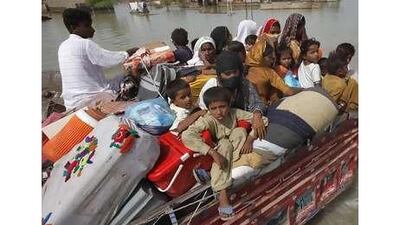ISLAMABAD // Thousands of flood victims left refugee camps over Eid and returned to their muddy farms, relief workers said yesterday. Their exodus came amid growing concerns, expressed by Pakistani volunteers and the United Nations, that deteriorating security is hampering international effort to help the flood victims.
Video: Pakistan floods 2010
Taimur Khan, reporting from Pakistan's worst flood affected regions in 2010, speaks to Claudia Charlton about the progress in delivering aid and the plight of stranded villagers and refugees.
Watch this video in full screen here
The government says the floods have affected 20 million Pakistanis and left 10 million of them homeless. The government yesterday began distributing small amounts of compensation to victims in central Punjab and southern Sindh provinces. However, the government's sluggish response has provoked speculation that the country's military could be planning to leverage the crisis to stage a coup. The fears drew comment on Wednesday from the president, Asif Ali Zardari, and the visiting United States special representative for Afghan and Pakistan, Richard Holbrooke.
Mr Zardari said any plot to subvert democracy would fail. "We have achieved democracy after a long struggle and we know how to defend it," the president said, responding to questions at a press conference in Islamabad. "It is democracy which is holding together the country, even at this time of catastrophe." Mr Holbrooke echoed previous statements by Pakistani ministers praising the army's role in helping flood victims as "part of the government".
"We will only support a civilian, democratically elected government," he told reporters in Karachi. The International Crisis Group, a Brussels-based conflict resolution group, yesterday warned international donors not to channel aid through the military. "Given the scale of the needs, there may be a temptation among donors to circumvent civilian structures and work directly with the military to deliver aid, but this would be a dangerous choice," Samina Ahmed, the group's South Asia project director, said.
Pakistani relief workers, based in Punjab province, said even army units were struggling to maintain order during food distribution. They said victims were becoming increasingly desperate because it was so difficult to get aid. Some had begun looting relief goods. Volunteers from the University of Lahore, who have been working in the area since mid-August, said they had on September 9 seen soldiers fire warning shots to disperse flood victims who had threatened to overwhelm them during a distribution of food near the town of Fazilpur.
Two days earlier, a team of teachers said they saw a four-truck convoy, operated by a Pakistani NGO, stopped and robbed by crowds on the road linking Rajanpur to Jampur. The provincial government has advised the UN and NGOs not to deploy staff where they might be endangered. Restrictions on their movement was the biggest obstacle facing aid workers, the UN office for the coordination of humanitarian affairs said in a statement on Tuesday.
Usman Ali, who has led the university volunteers, said the increasing violence was a reflection of the inability of the government and NGOs to supply aid to areas away from the main roads. "There are many areas which are not accessible even to army trucks," he said. "Our teams, accompanied by local guides, have travelled by motorcycle to conduct surveys of even the remotest communities. That has involved driving through standing waters in fields, and loading the bikes on boats to reach areas where that has not been possible," said Mr Ali, a lecturer in electrical engineering.
Qamar Zaman Kaira, the minister for information, told journalists in Islamabad that initial compensation payments would be made to flood victims within 45 days. Victims receive automated teller machine cards, each credited with 20,000 rupees (Dh857). The programme would be extended to northern Khyber-Pakhtunkhwa and Balochistan next week, when provincial authorities provide lists of affected people to the federal government, he said.
Yousaf Raza Gilani, the prime minister, yesterday created a national oversight disaster management council to review reconstruction plans and their implementation, the official Associated Press of Pakistan news agency reported. The members he appointed were largely retired civil service chiefs and supreme courts judges drawn from all four of Pakistan's provinces.
thussain@thenational.ae
* Mansoor Ahmed reported from Rajanpur

